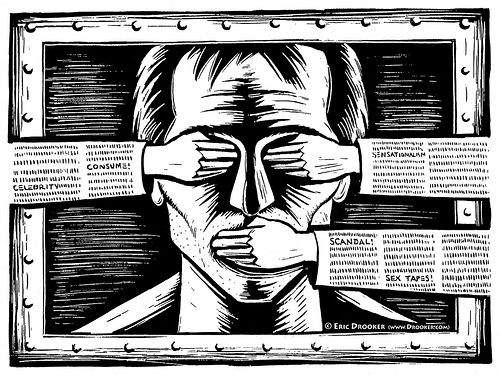by The Cowl Editor on October 26, 2017
Opinion

by Kevin Copp ’18
Opinion Staff
The role of the media in the American zeitgeist today is impossible to understate. In the age of information, the news sources and outlets that people return to day after day and year after year have the power to shape the deep sociological ideals that form the basis of our society. Put simply, the media informs virtually everything we know about the world. Consequently it is imperative that the media act responsibly: it must print everything that has been said and provide honest commentaries on the developments that could impact people’s lives.
However, in recent times the media have provided extensive coverage of figures without providing the corresponding context necessary to put these figures in their proper places. Such a lack of context harms the whole of society as the imbalance of coverage over context improperly permits more power to figures who do not deserve or need such power. This improper amount of power almost always leads to harm.
One rather benign example of this imbalance is the ludicrous amount of attention that LaVar Ball, the father of Los Angeles Lakers basketball player Lonzo Ball, receives from the national media. Although Lonzo Ball was an All-American and the second overall pick in the NBA draft last year, his father has stolen much of the media spotlight from him due to a number of absurd comments and claims he has made about his son’s playing ability.
While a few members of the media have derided many of Ball’s ridiculous comments, especially one that claimed Lonzo is better than two-time league MVP Stephen Curry, most of the media have failed to put Ball’s comments in the proper context. The media can report on whatever they choose, the opinions of basketball players’ parents are fair game as long as the media explain the real meaning behind the comments.
In LaVar Ball’s case, the real context of the entire situation is this: He has long made comments to the media knowing any publicity at all will help him advertise his line of $495 shoes, with his son as the number one promotional figure. He knows the media circus created by someone willing to say anything at all will attract shoe nuts and even ordinary viewers to his products. ESPN, Fox Sports, and any other sports media group all need to do the right thing and describe Ball as what he really is: a money-grabbing charlatan. Otherwise, their extensive and over-the-top coverage of Ball puts more money in his pocket—the only thing he really wants.
The greater significance of the media’s refusal to condemn figures like Ball and other attention hogs is that regular people are influenced by these repulsive figures. Other people with great access to the media can say anything just to grab attention, knowing a failure of the media might let them exploit their opportunity and take more power. A crazy, narcissistic businessman might even run for President of the United States. And win.
What the media must do any time a figure attempts to exploit their attention for more power is to be extremely explicit. As Donald Trump secured the Republican nomination, HuffPost ran an editor’s note at the bottom of every story concerning Trump and described him as “a serial liar, rampant xenophobe, racist, misogynist, and birther.” Although a left-leaning publication, HuffPost’s willingness to call the situation as they saw it and to be completely explicit could have helped prevent a Trump presidency had all other major media outlets taken the same initiative. Until mass media starts to do this more often, the men and women in America will be influenced just as much, if not more, by goons like Ball and Trump as they are by people of the highest moral character.